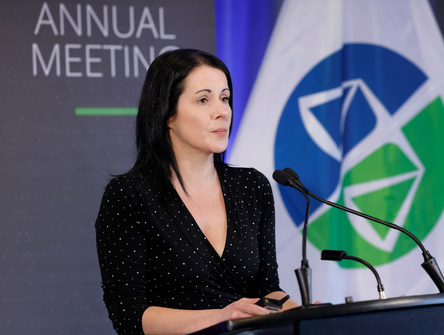Le Canada pourrait-il être poursuivi en justice en raison de son manque d’action climatique?
Un nouvel avis consultatif de la Cour internationale de Justice affirme que les pays peuvent être tenus légalement responsables de leurs émissions de gaz à effet de serre et être contraints à verser des réparations aux personnes lésées par les changements climatiques

Un avis consultatif historique de la Cour internationale de Justice ouvrant la voie à des poursuites entre pays sur fond de changements climatiques pourrait avoir des conséquences pour les pays développés, notamment le Canada.
La Cour, composée de 15 juges du monde entier, a été officiellement invitée par les Nations Unies à statuer sur les obligations juridiques des pays en vertu du droit international. Dans sa décision unanime de 140 pages, publiée le 23 juillet, elle déclare que les états ont l’obligation de protéger l’environnement et le système climatique contre les dommages causés par les émissions de gaz à effet de serre, et d’agir avec diligence et coopération pour y remédier. Cela inclut le respect des engagements pris dans le cadre de l’Accord de Paris, dont l’objectif était de limiter le réchauffement climatique à 1,5 degré Celsius par rapport aux niveaux préindustriels.
Dans ce qui pourrait marquer une nouvelle ère de réparations climatiques, la Cour précise également que, s’ils n’y parviennent pas, les états pourraient être obligés de verser des indemnités et d’accorder d’autres formes de restitution aux pays les plus touchés par les changements climatiques. Cela est important pour les pays ayant des industries intensives de combustibles fossiles, dont le Canada fait partie.
La décision a été saluée comme une « victoire juridique historique » pour les petits états insulaires, d’où provient à l’origine la demande d’avis consultatif. Un groupe d’étudiants en droit de l’Université du Pacifique Sud à Vanuatu, tous originaires de pays insulaires du Pacifique, qui sont parmi les plus vulnérables au monde dans la crise climatique, a réussi à faire avancer la cause.
« La CIJ a reconnu ce que nous avons vécu, notre souffrance, notre résilience et le droit à notre avenir, a dit Flora Vano, étudiante du Vanuatu, à la BBC. C’est une victoire non seulement pour nous, mais aussi pour toutes les communautés de première ligne qui luttent pour se faire entendre. »
Non contraignant, mais influent
Bien que l’avis du plus haut tribunal au monde n’ait pas force exécutoire, les spécialistes juridiques s’attendent tout de même à ce qu’il ait une incidence mondiale, notamment parce qu’il clarifie le droit au niveau international.
« Des juges et juristes du monde entier considèrent ce genre d’avis consultatifs comme une interprétation faisant autorité en droit international, souligne Fraser Thomson, avocat chez Ecojustice. Nous avons vu des tribunaux à tous les niveaux au Canada s’y référer dans leurs causes, de sorte que les tribunaux évaluant les affaires climatiques accorderont probablement une attention particulière à cette décision. »
Les répercussions sur les cours de notre pays seront mises à l’épreuve dans quelques mois lors du retour de l’affaire Mathur devant les tribunaux. La contestation constitutionnelle novatrice des objectifs climatiques du gouvernement de l’Ontario, menée par des jeunes, reprendra en décembre.
L’automne dernier, la Cour d’appel de l’Ontario a statué en faveur des jeunes, concluant que l’action climatique de l’Ontario est assujettie à la Charte des droits et libertés.
En mai, la Cour suprême du Canada a refusé d’entendre un appel de cette décision, qui concluait à l’unanimité qu’il ne s’agissait pas d’une affaire de droits positifs, car la demande ne vise pas à imposer de nouvelles obligations climatiques positives à la province. Puisque l’Ontario a volontairement assumé une obligation législative positive de lutte contre les changements climatiques lors de l’adoption de la Loi annulant le programme de plafonnement et d’échange, il devait s’assurer que son plan et ses cibles étaient conformes à la Charte.
L’affaire sera maintenant renvoyée devant la Cour supérieure pour être résolue.
Me Thomson, l’un des avocats à la tête du litige, croit que la décision de l’Ontario de réduire ses objectifs climatiques correspond « exactement au genre de conduite que la CIJ dénonce ».
L’avis, qui s’inspire de données scientifiques du Groupe d’experts intergouvernemental sur l’évolution du climat, n’est pas un avis unique. Il renforce plutôt un consensus croissant de juges du monde entier selon lequel la crise climatique est une crise des droits de la personne, et qu’un environnement sain et un climat sûr sont une condition préalable à ces droits.
« La plus haute instance juridique au monde, à la demande de l’Assemblée générale des Nations Unies, a clairement indiqué que les gouvernements ont la responsabilité de protéger les droits de la personne face aux menaces climatiques croissantes, observe-t-il. Nous croyons que cela donnera de l’espoir (à des causes comme la nôtre). Nos jeunes clients demandent au tribunal de mettre en œuvre cette tendance croissante de décisions qui reconnaissent les conséquences des changements climatiques. »
Reconnaissance de l’incidence du climat sur les océans
Sara Seck, titulaire de la chaire Yogis et Keddy en droits de la personne et directrice de l’Institut du droit maritime et environnemental de l’Université Dalhousie, convient que la Cour a clairement indiqué que le droit à un environnement sain faisait partie du droit international des droits de la personne.
« Je pense que cela sera très important en ce qui concerne la capacité des demandeurs devant les tribunaux canadiens de présenter des arguments sur les responsabilités climatiques et autres du Canada, note-t-elle. Il y a cet éclaircissement qui précise que, même si nous avons simplement le droit à la vie dans la Charte, cela doit être interprété à la lumière du droit à un environnement propre, sain et durable. »
Le Canada a reconnu le droit à un environnement sain dans une loi fédérale pour la première fois en juin 2023 avec l’adoption du projet de loi S-5, qui modifiait la Loi canadienne sur la protection de l’environnement. Une coalition de groupes œuvrant dans les domaines de la justice, de la santé et de l’environnement a récemment demandé à la ministre de l’Environnement, Julie Dabrusin, de mettre pleinement en œuvre les modifications visant à protéger le droit à un environnement sain en se fondant sur le cadre de mise en œuvre que le gouvernement fédéral a publié à la fin juillet.
Mme Seck est également ravie que la CIJ discute des implications des changements climatiques sur le milieu marin et indique clairement que les états ont des obligations vis-à-vis de l’océan lorsqu’ils s’engagent dans des activités sur leur territoire.
« Les changements climatiques causent des dommages importants à l’océan, signale-t-elle. Nous sommes un pays dépendant et entouré d’océans, mais nous n’avons absolument pas réussi à établir un lien entre les émissions provenant du développement, de la production et de la consommation de combustibles fossiles et leurs conséquences sur les océans. »
Les océans couvrent 70 % de la surface de la Terre, génèrent 50 % de l’oxygène dont nous avons besoin, absorbent 30 % des émissions de dioxyde de carbone et captent 90 % de l’excès de chaleur généré par ces émissions. Ce sont les poumons de la planète, mais aussi le plus grand puits de carbone du monde, agissant comme un tampon critique contre les répercussions des changements climatiques.
L’avis de la CIJ intervient un peu plus d’un an après la publication par le Tribunal international du droit de la mer d’un avis consultatif sur les obligations qu’ont les états de protéger le milieu marin contre les conséquences des changements climatiques en vertu du droit international, en particulier de celles qui sont le résultat d’émissions de gaz à effet de serre. Il établissait que les GES relevaient de la définition de « pollution du milieu marin » figurant à l’article 1 de la Convention des Nations Unies sur le droit de la mer et que les états devaient prendre « toutes les mesures nécessaires » pour prévenir, réduire et contrôler la pollution marine qu’ils produisent.
La CIJ a statué que les gouvernements sont responsables des effets climatiques qu’ont les entreprises exploitées dans leur pays. En outre, elle a estimé que les subventions octroyées à l’industrie des combustibles fossiles ou l’approbation de nouvelles licences pétrolières et gazières pourraient violer les obligations d’un pays en vertu du droit international.
En juin, le gouvernement fédéral a adopté une loi controversée qui donne au cabinet le pouvoir d’accélérer les projets qu’il juge d’intérêt national. Il pourrait s’agir de chemins de fer, de projets miniers et d’oléoducs visant à acheminer vers de nouveaux marchés ce que le premier ministre Mark Carney appelle du « pétrole décarboné ».
Selon Mme Seck, la progression dans cette trajectoire est « très problématique », car elle est « tout à fait incompatible » avec l’avis de la CIJ. Cela est dû en partie au fait que la Cour a clairement indiqué que les états doivent comptabiliser les émissions de gaz à effet de serre qui découlent de la consommation de combustibles fossiles en aval, et pas seulement celles qui proviennent du processus d’extraction.
« Cela n’est pas la pratique ici », ajoute-t-elle, notant que, si le développement de combustibles fossiles neutres en carbone semble bon en théorie, les émissions qui découlent de leur combustion doivent également être prises en compte.
Rejeter la faute sur les coupables
Selon Me Thomson, la CIJ impute la responsabilité de la menace climatique existentielle là où il faut, soit les gouvernements et les entreprises de combustibles fossiles habilités par les gouvernements, tout en alimentant sciemment la crise.
« Nous connaissons les antécédents des gouvernements. Ils donnent et distribuent des milliards de dollars (en subventions) chaque année à une industrie déjà extrêmement rentable qui cause des dommages à notre planète », dit-il, notant que cela s’est produit alors que le Canada échoue constamment à atteindre les objectifs climatiques qu’il s’est fixés. « La CIJ les interpelle maintenant directement. »
Le magazine ABC National a communiqué avec Environnement et Changement climatique Canada afin de recueillir des commentaires sur l’avis de la Cour, plus précisément sur la question de savoir si cela crée des pressions pour augmenter les objectifs de réduction des émissions du Canada, pour réduire la production de combustibles fossiles ou pour modifier les subventions fédérales accordées aux entreprises de combustibles fossiles dans le but de respecter les obligations sous le régime du droit international. La demande a été redirigée à Affaires mondiales Canada.
« Nous accordons beaucoup d’importance et de valeur au rôle essentiel que joue la Cour internationale de Justice dans la résolution des différends juridiques entre les pays et dans la prestation de conseils juridiques sur des enjeux mondiaux – y compris les changements climatiques – lorsque des organismes internationaux, comme l’Assemblée générale des Nations Unies, le demandent », a déclaré Thida Ith, porte-parole d’Affaires mondiales Canada, dans un communiqué.
« Le Canada a pris part à la procédure qui a conduit à cet avis. Les conclusions de la Cour sont détaillées et complexes, et nous les examinons maintenant attentivement. »
Mme Seck espère que l’avis suscitera suffisamment d’inquiétude pour inciter le Canada à « essayer de mettre en place un plan d’action ».
« Il n’y aura aucun moyen d’éviter cela, car cela passera soit par les tribunaux internationaux, soit des litiges climatiques (nationaux) », affirme-t-elle.
En plus de la nécessité pour tout pays de réglementer l’industrie sur son territoire et dans les limites de son ressort, elle souligne que l’avis de la Cour comporte des questions intéressantes qui concernent la mesure dans laquelle le Canada appuie le développement des combustibles fossiles dans d’autres pays et la question de savoir si cela devrait également être une source de préoccupation.
« Il sera très intéressant de voir s’il y a une réaction au niveau fédéral, ajoute Sara Seck. Je m’attends à ce que la réaction soit lente et pas nécessairement publique. »


